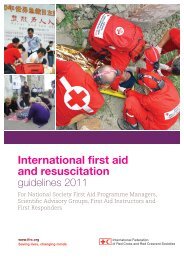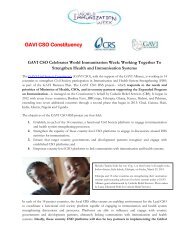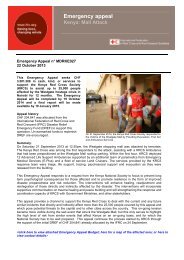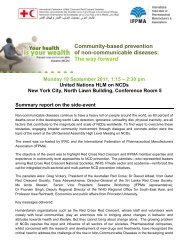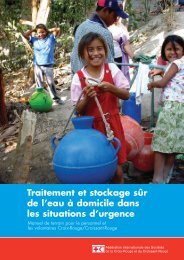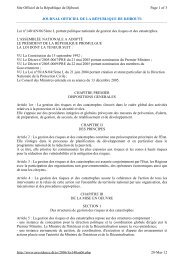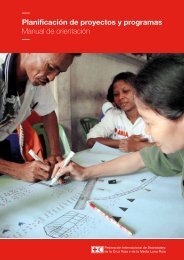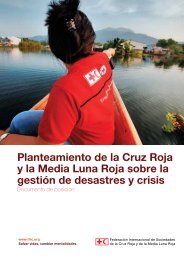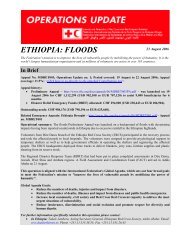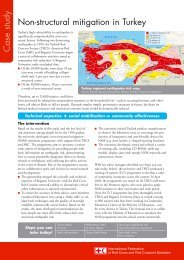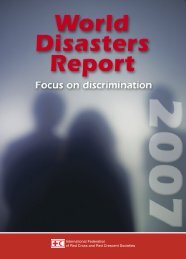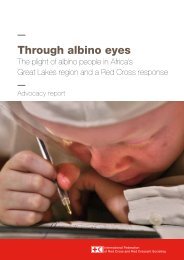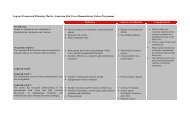World Disasters Report 2010 - International Federation of Red Cross ...
World Disasters Report 2010 - International Federation of Red Cross ...
World Disasters Report 2010 - International Federation of Red Cross ...
Create successful ePaper yourself
Turn your PDF publications into a flip-book with our unique Google optimized e-Paper software.
Urbanization and<br />
climate change risk<br />
All successful urban centres provide pro<strong>of</strong> <strong>of</strong> the ability <strong>of</strong> human societies to adapt to<br />
the particular physical and climatic conditions in which they are located. While disaster<br />
events have long had the capacity to disrupt urban communities, livelihoods and<br />
economies, climate change presents a new and systematic challenge to urban development<br />
and sustainability. Last year was the fifth warmest year on record and the decade<br />
2000–2009 was warmer than the previous two record-breaking decades. In 2009,<br />
severe climate events included: a record-breaking heatwave which badly affected major<br />
urban centres in southern Australia; drought-related food shortages in Kenya which<br />
affected slum dwellers in Nairobi; and heavy rains which caused floods in many towns<br />
across central Europe.<br />
This chapter explains the need for a specific focus on climate change and how it impacts<br />
urban centres, while recognizing that good practices in disaster risk reduction are at the<br />
core <strong>of</strong> climate change adaptation in most instances. Firstly, it assesses the ways in<br />
which climate change will affect patterns <strong>of</strong> risk, using both a geographical analysis (the<br />
distribution <strong>of</strong> risk between cities) and a social analysis (the distribution <strong>of</strong> risk within<br />
cities). This highlights how, without adequate adaptation, the increase in disaster risk<br />
in the next few decades is likely to be unprecedented through more intense or frequent<br />
storms, more intense precipitation and more serious heatwaves and drought. Secondly,<br />
it illustrates the ways in which efforts to reduce risk from disasters will increasingly<br />
need to incorporate an explicit awareness <strong>of</strong> climate change issues. Finally, it looks at<br />
the ways in which cities can address climate change – both through reducing greenhouse<br />
gas emissions and through adapting to cope with the consequences. These practices<br />
are particularly important in the global context <strong>of</strong> increasing urbanization and<br />
the need to improve the well-being <strong>of</strong> urban residents – including issues <strong>of</strong> mobility,<br />
shelter and food supply – without increasing energy use and greenhouse gas emissions.<br />
Responding to climate change requires improving existing structures and building the<br />
capacity <strong>of</strong> departments responsible for urban development and environmental management<br />
– and their links to the institutions responsible for disaster response. At the<br />
same time, climate change adaptation can be used as an entry-point to develop more<br />
effective environmental strategies that meet the needs <strong>of</strong> urban residents. If properly<br />
addressed, adapting to climate change can help cities to meet a wider range <strong>of</strong> desirable<br />
objectives concerning liveability, service provision and the reduction <strong>of</strong> disaster risk.<br />
This will require a sharing <strong>of</strong> knowledge and skills between the two communities <strong>of</strong><br />
practice, so that climate change practitioners can learn from the experiences <strong>of</strong> disaster<br />
risk reduction, and disaster risk reduction can cope effectively with new climate<br />
challenges.<br />
<strong>World</strong> <strong>Disasters</strong> <strong>Report</strong> <strong>2010</strong> – Focus on urban risk<br />
Photo opposite page:<br />
Many people living<br />
in developing<br />
countries’ coastal<br />
cities, such as here<br />
in Dakar, Senegal,<br />
face ever more severe<br />
floods due to more<br />
frequent storm surges,<br />
heavy rainfall and<br />
inadequate drainage<br />
systems.<br />
© Ricci Shryock / IFRC<br />
115



